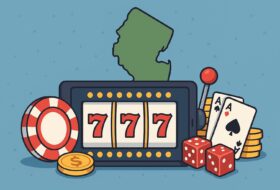
Online gambling operators have to be careful about how often they message their customers and what content those messages contain. So say responsible gambling advocates who spoke to Online Poker Report.
They point out that increasing app engagement is a double-edged sword. Though it’s good for the company, it can also mean inadvertently encouraging problem gambling behavior. Even the just the constant presence of the brands themselves can be tempting to problem gamblers.
Keith S. Whyte, executive director of the National Council on Problem Gambling (NCPG), told OPR:
“People with gambling problems are affected more by gambling marketing than other viewers. They remember it more, react to it more and spend more time and money gambling after viewing it than gamblers without problems.”
He further cited research published on Aug. 9 in PubMed that found at-risk bettors seeing “wagering inducements” increased:
“Gambling intensity, … gambling frequency … and at-risk gambling behaviors … at the same week of their use. This effect was stronger for at-risk gambling behaviors and at-risk gamblers. Conclusions: Wagering inducements may represent a risk factor for developing or exacerbating gambling problems.”
This is part of an ongoing series of articles examining marketing and customer engagement in iGaming. Recent installments have covered app engagement in broad terms, how it applies to younger gamblers specifically, and what the market leader BetMGM is doing to improve in that regard.
Online gambling operators and responsible gambling
Marketers in other industries can consider app engagement to be a nearly independent marketing variable. Legal online gambling operators, on the other hand, have a balancing act to do. They must weigh their metrics for assessing engagement against regulation and their commitments to responsible gambling efforts. This makes marketing less of an academic subject and more of a practical minefield for regulated gambling operators.
While BetMGM, DraftKings and FanDuel didn’t respond to emails requesting comment for this article, each has responsible gambling programs in place as required by state regulations.
Perhaps the most visible manifestation of these rules is the ubiquitous message:
“Gambling Problem? Call 1-800 GAMBLER for help.”
BetMGM Casino is one of many operators you’ll see displaying that particular text. However, like most legal online gambling operators, BetMGM tries to show its commitment to responsible gambling but doing more than is strictly required by law. For example in April, BetMGM added the responsible gambling education program GameSense to its online platforms.
Ads aimed at increasing app engagement may worsen issues
Cheryl Moss, a retired judge who presided over Nevada’s first Gambling Treatment Diversion Court (GTDC), had this to say to OPR:
“I live in Las Vegas. Advertisements are everywhere: on billboards, in mailers and on TV stations. And when you land at McCarran [International] Airport, ads are everywhere.
“But it is Las Vegas – the gaming capital. So it is no surprise to visitors who come here for vacation or conventions. There are ads also from operators who advertise on TV with the ‘locals’ being acknowledged – ‘most favorite casino for locals.’ Adverts abound in Las Vegas, and access to gambling is easy to find. The percentage of disordered gamblers is twice the national average … because this is the gaming capital and seeing ads is the norm here. Accordingly, the more ads in one city dedicated to gambling as a main source of tourism and revenue seems to correlate with the NCPG survey.”
Since retirement, Moss has been working to push lawmakers to establish such courts in other states.
Citing her sources
As for the first statistic Moss cited, she said 6% of Nevadans have gambling problems, per figures from the American Psychiatric Association. The association’s fifth edition of the Diagnostic and Statistical Manual of Mental Disorders (DSM-5) states that 2 million US adults (1%) “meet criteria for severe gambling problems in a given year.” Between 4 and 6 million (2% to 3%) have “mild or moderate” gambling problems.
Her second reference to research relates to an NCPG survey in which 56% of the respondents thought “seeing a lot of ads” was somewhat to very likely to “cause a gambling problem.”
Moss said:
“My thoughts are additional research studies and grant funds are what is needed to validate the 56%.”
Considering that figure represents public perception, it may warrant further study.
Whyte said of his organization’s research released in March:
“The survey is measuring the general public’s opinions on causes of problem gambling, and it is clear they do see gambling advertising saturation as a problem. We also believe gambling advertising has an impact, but causes of gambling addiction are also deeply rooted in an individual’s biology, psychology and environment.”
Ads and marketing don’t cause addiction
All of the responsible gambling advocates OPR spoke to agree that advertising and marketing don’t cause gambling addiction. However, they are likewise unanimous that ads and marketing efforts can often exacerbate existing issues.
Jamie Salsburg is a former problem gambler who now helps organizations develop better social responsibility programs and campaigns through his firm Dyve. He also maintains a blog and hosts the After Gambling Podcast. He told OPR:
“I wouldn’t go so far as to say increased advertising causes a gambling problem, as I believe addiction to be far more complex than that. However, if the ad prompts someone to begin gambling and over time they develop a gambling addiction, then the ad clearly played some role in that outcome. Was it the cause? I doubt it. But it had some contribution.”
App engagement vs. poor impulse control
Online poker players sometimes brag about their long sessions. They have the ability to push back sleep and stay at the table for as long they feel they have an edge. That conviction that they shouldn’t leave a soft game until the “fish” do is what’s more commonly known as fear of missing out (FOMO).
Most marketers know about FOMO and use it in their messaging, across verticals.
However, that trigger is one that online gambling operators in particular need to use in moderation. Moss pointed out the fact that gambling addiction is an impulse control disorder. (Gambling addiction was treated as an impulse control disorder in the DSM-4. In the DSM-5, it is in the same category as substance addictions. However, these themselves have significant comorbid overlap with impulse control disorders.)
“A person with a severe gambling disorder is focused on the game. They don’t want to be wined and dined, get free tickets to a show. All they can think about is going to play poker, slots or craps or play online on an app.
And those thoughts are one-track-mind obsessions that take over their brains to the point they cannot function daily and cash everything out. They will spend all of it gambling and have 17 cents left. When it is gone, they are too ashamed to tell their spouses and family and children. Suicidal thoughts may come up. After all, they just dropped half a million dollars gambling online. They kept chasing their losses, hoping for a big win. And when they do win big, they just continue to play more than walk away. They cannot rationalize; hence, why they have an impulse control disorder.”
What more can online gambling operators do?
Salsburg advised that operators have systems in place to identify and flag problem gambling behaviors, then follow up on those.
He added:
“Increased engagement with an app can play a significant role in someone moving across the spectrum from a casual gambler to a problem gambler. This is widely accepted as a fact by all stakeholders and is why setting time limits is a cornerstone of responsible gaming content. However, the marketer is tasked with increasing time and ultimately money spent on the app to meet business goals. It’s a conflict that is quite complex and undermines many responsible gaming efforts.”
Moss noted that Nevada’s regulations just strengthened operators’ requirements regarding customer self-exclusion.
However, there’s more operators can do, she said:
“I don’t believe the issue is limiting operator efforts to maximize customer engagement. Gambling is a form of entertainment, but for a small percentage, it is harmful. I believe that operators have the sophisticated technology and algorithms to learn details about what customers like, how much they typically gamble, what games they prefer, etc. These same programs and algorithms can also be very helpful in identifying customer gambling patterns to the extent that it can be recognized and spotted that the customer may have a gambling disorder.”
Catching the problem early is important, but difficult
Part of the problem is that there isn’t enough focus on prevention. The online gambling industry tends to rely on bettors themselves to self-report and self-exclude. Most, however, will only do this if they’ve already hit rock bottom.
There’s an inherent problem with that, wrote Jennifer Shatley – a research assistant at the International Gaming Institute at the University of Nevada at Las Vegas.
She opined in a September 2020 blog post on the university’s site:
“Responsible gambling programs are often thought to be problem gambling programs. Because of this, casino patrons might ignore responsible gambling programs, because they don’t identify themselves as problem gamblers.”
In other words, by the time gamblers can recognize that they need help, the damage has often already been done.
The question of where to draw the line
Frequency of gambling is quantifiable and measurable. Up to a point, higher frequency is desirable from a marketing perspective. Beyond that point, it becomes an indicator of a developing gambling problem. Unfortunately, how much is too much can be subjective. Operators desperately need help in determining when to ease off the gas pedal with their engagement strategies.
Whyte said:
“It is hard to draw a bright line, but guidance is absolutely needed and we are happy to work with operators on best practices. Research and access to user data will be critical to help determine when that engagement begins to lead to excessive use, and eventually account closure and self exclusion. Once we know that we can work backwards to see if there are common factors or engagement efforts that trigger negative consequences.”
Salsburg said online gambling operators are running a business and companies have to make money to survive. Therefore, there’s always going to be a push-pull.
He summed it up:
“I have no way of knowing how often intervention is chosen over revenue. But until it becomes the default way of doing business, we will continue to see case studies where all parties end up losing.”





